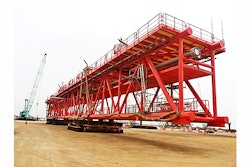Project LIBERTY, the nation’s first commercial-scale cellulosic ethanol plant to use corn waste as a feedstock, announces the start of production. Once operating at full, commercial-scale, the biorefinery in Emmetsburg, IA will produce 25 million gallons of cellulosic ethanol per year - enough to avoid approximately 210,000 tons of CO2 emissions annually.
Developed with the support of approximately $100 million in investments and research from the U.S. Department of Energy, the facilities use biochemical conversion technologies such as yeast and enzymes to convert cellulosic biomass into transportation fuels.
“The Energy Department’s investments in projects like the LIBERTY biorefinery are helping to bring innovative, cost-cutting biofuel technologies online and diversify our transportation fueling options,” says Secretary Ernest Moniz. “Home-grown biofuels have the potential to further increase our energy security, stimulate rural economic development, and help reduce greenhouse gas emissions from the transportation sector.”
Project LIBERTY will produce cellulosic ethanol from corncobs, leaves, husks and corn stalk harvested by local farmers located within a 30 to 40 mile radius of the plant, producing 2,600,000 MMBTu (or million British Thermal Units) per year from the anaerobic digester and solid fuel boiler to power the entire facility as well as POET-DSM’s co-located existing corn ethanol plant. This is enough to power about 70,000 American homes for a year.
"The Project LIBERTY opening demonstrates that America is ready for advanced renewable energy production. USDA invested to help bring this facility online because it is boosting America's energy independence, cutting carbon pollution, and holds great promise for our domestic agriculture and energy industries,” says Agriculture Secretary Tom Vilsack. “This facility has already created local jobs and opportunities for farmers, and it will continue to spur local investment and open the door for new technology and job growth across rural America. I congratulate the POET-DSM Advanced Biofuels team on their grand opening and for all they have done and the opportunities they will continue to create for farmers and rural communities."
The Department of Energy has supported this first-of-a-kind project's engineering, construction, biomass collection and infrastructure through approximately $100 million in cost-shared support over seven years, beginning in 2007.
Project LIBERTY is the nation’s second commercial-scale cellulosic ethanol biorefinery to come online. In 2013, INEOS Bio’s Indian River BioEnergy Center in Vero Beach, FL, began producing 8 million gallons of cellulosic ethanol per year from vegetative, yard and municipal solid waste. Project LIBERTY will serve as a test bed for producing cellulosic ethanol with biochemical conversion technologies, helping to inform the design and construction of other advanced biofuels projects.



















